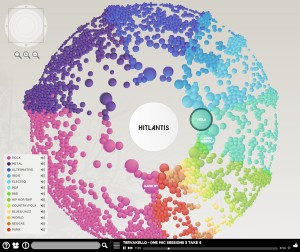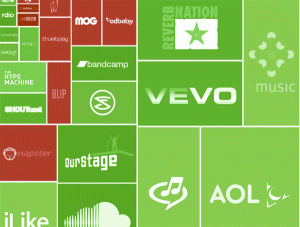Turning Up The Heat On Artist Discovery
posted in: Music News
Everyone loves the satisfaction of introducing their friends to a great new band they’ve never heard of before, and the music discovery Web site Hitlantis wants to help listeners find these hidden gems. The site is a haven for lovers of independent music, with more than 2,700 bands just waiting to be uncovered.

Visitors of Hitlantis’s Web site are greeted by a giant, circular conglomeration of unsigned artists, each with their own, smaller circle. Users can create a profile, then browse color-coded genres including metal, pop, blues and punk. Clicking on one of the smaller orbs allows listeners to hear full tracks from that artist. The more popular an artist gets, the closer they move to the center of the circle.
The site also offers incentives for artists and fans; popular Hitlantis bands can win live gigs, and the most active music lovers on Hitlantis can win tickets to events. While we’re not sure if clicking colorful circles at random really makes it any easier for up-and-coming artists to get discovered, Hitlantis’s growing fanbase and a partnership with Universal Music has them headed in the right direction.
In other music discovery news, marketing agency Nuevo5 has compiled a list of digital traffic to music sites in 2010. What’s interesting is that attention-getters like Spotify and Napster actually suffered declining growth in 2010, while industry mainstays AOL Music and Last.fm saw a drastic decrease in growth.

It was start-ups like Rdio, SoundCloud and OurStage that showed the greatest growth in 2010. OurStage came in 13th in page visits in 2010, with 2,500,000 views. That’s a 579% increase from the previous year, making OurStage one of a minority of companies” including Groove Shark and Pandora”who showed triple-digit growth in 2010. The sites that showed the greatest growth were those which allow listeners to interact with artists and with each other, and Nuevo5’s message to bands and labels is that fan engagement will become increasingly important in the future. The music is not your commodity, they reported, The fans are.
